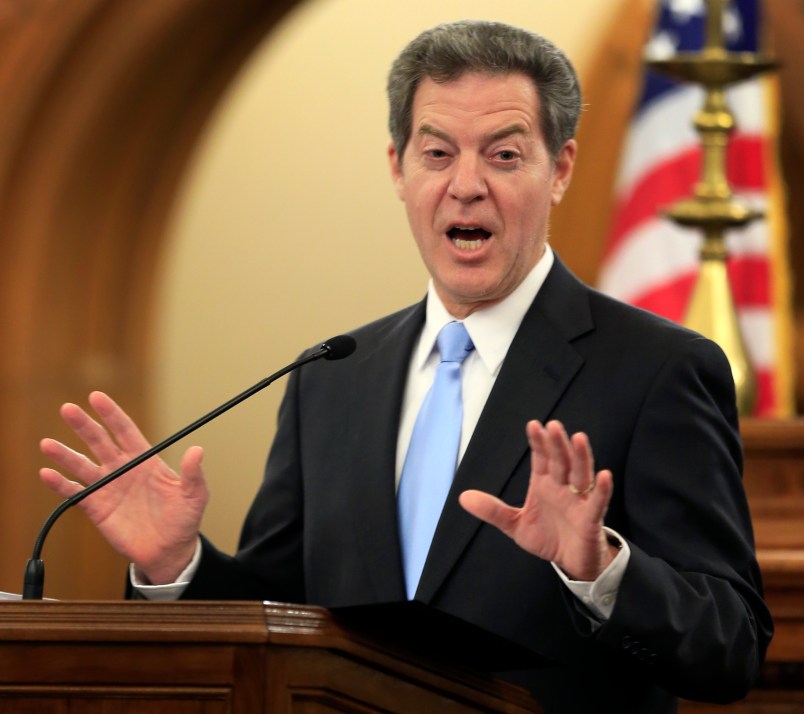Gov. Sam Brownback (R-KS) wasn’t on the ballot, but Tuesday’s elections suggested that even the state’s Republicans believe his Kansas experiment has been a failure.
The GOP primary was a bloodbath for Brownback’s buddies in the state legislature. Five far-right conservatives in Kansas’ House and six state senators lost their seats to Republican challengers. The losing incumbents included Senate Majority Leader Terry Bruce, an oft-ally of the governor. The hardliners were defeated by a wave of moderate Republicans, who were also victorious in a number of open elections Tuesday. The purge of Tea Party state lawmakers — by Republican primary voters no less — is being viewed in the state as a referendum on Brownback’s agenda on cutting taxes and shrinking government to minuscule levels.
“This is the first time ever that quote-unquote ‘conservatives’ have controlled the governorship, controlled both chambers of the state legislature, but now instead of challenging the system, they were responsible for running it,” said Patrick Miller, a political scientist at the University of Kansas. “Clearly, at least so far in the Republican electorate, there was a lot of discontent with how they ran it.”
The anti-Tea Party fervor also appeared to play a role in the defeat of U.S. Rep. Tim Huelskamp (R-KS), a prominent member of the House Freedom Caucus, to a more pragmatic-minded challenger Tuesday.
The schism between the Kansas’s GOP’s hard-right and more mainstream factions has been festering for years, and in many ways parallels tensions among Republicans at the national level, according to Edward Flentje, who served in the administrations of former Kansas Govs. Robert F. Bennett (R) and Mike Hayden (R) as well as in other government positions.
“The ‘94 election was the first time that this coalition of far-right free market folks hooked up with evangelicals, the ‘right to life’ folk, and started making headway,” Flentje said, adding that that throughout the 20th century, the Kansas GOP had been the party of more moderate, compromise-oriented Republicans.
The hardliners continued to make gains in the elections throughout the aughts, but it was only in 2010 when one of their own captured control of Kansas’ governor’s mansion. The last six years have been coined “the Kansas experiment” — for Brownback and company’s Koch brothers-backed effort to reduce income taxes to nearly nothing — and with Tuesday’s elections, it does not look like voters are too satisfied with the results.
“The reality of the state’s fiscal mess has finally sunk in and incumbents were running for cover in every way they could,” Flentje said.
The Kansas budget is currently facing a $74.5 million deficit and has routinely undershot the revenues estimated under Brownback’s tax cut scheme. Just last week, the state’s credit rating was downgraded for the second year in a row, and for the third time under Brownback’s watch. The legislature is currently involved in a high-stakes fight with the state Supreme Court about the funding of Kansas’ education system, while the status of the state’s pension plans, Medicaid reimbursements and highway fund also remain in critical condition.
“The underlying, core issue was instability in the budget,” said Stephanie Sharp, a Kansas political consultant who was involved in a number of the campaigns that succeeded in overthrowing Tea Party incumbents.
The variety of issues affected by the state’s budget problems brought together a coalition of groups supportive of the more moderate candidates. According to Sharp, everyone from teachers groups and parents organizations to local businesses rallied around the campaigns against the hardliners.
Some Republicans — like ex-community college president Ed Berger, who defeated the Senate majority leader — ran on an explicitly anti-Brownback message, while others were more delicate in framing their anti-incumbent campaigns, as they were running in a Republican primary after all. But that won’t be a problem for Democrats in the fall, who have the seats of other hardliners in their sights for November’s election.
“We’ll see some wins for Democrats, because they really can pin the state of the economy on Brownback, far more aggressively than you can in a Republican primary,” said Burdett Loomis, who teaches political science at the University of Kansas.
At the very least, the Republican makeup in the legislature stands to undergo a significant makeover that could spell trouble for Brownback, who eked out a re-election win in 2014 but is one of the most unpopular governors in the nation.
“He is not, in practice, a politician who is very compromise-oriented,” Miller said. He noted that Brownback came into the governorship constantly fighting with moderates in his legislature and for the last four years has had a conservative-controlled statehouse that mostly went along with his priorities.
“It’s an open question: What’s his style going to be for his last two years? Is he going to dig in and try to protect his policies or is he going to say the voters have spoken and I need to moderate?” Miller said.







Dorothy should have stayed in Oz
Auntie Em:
Hate you, hate Kansas. Taking the dog.
/s/ Dorothy
Well, well. This should send shockwaves through the GOP (and not just the TeaBuggers). Their entire fiscal doctrine (killing taxes = growing economy) has just been given the thumbs down in Kansas, of all places.
One could only hope
Gee who could have thunk it cutting taxes and not bringing any money in would cause a deficit.